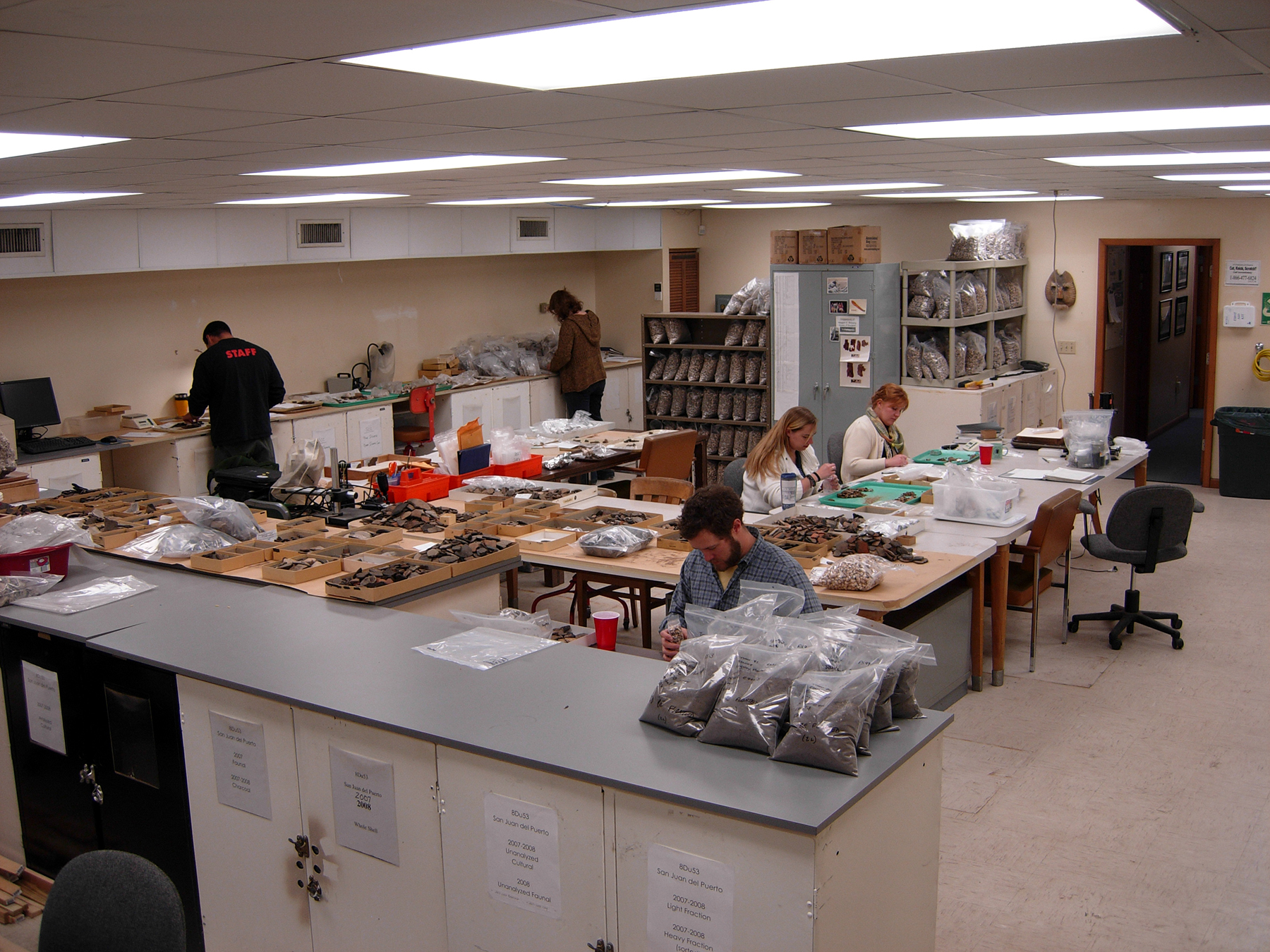
Faculty archaeologists conduct research in the Americas (North, Central, and South America) and Africa. Their research interests include the following topics:
- archaeological method and theory
- archaeology and history
- art and architecture
- artifact analysis (ceramics, lithics)
- complex societies
- contextual archaeology
- ecological and environmental archaeology
- ethnoarchaeology
- ethnohistory
- evolutionary archaeology
- foodways
- historical anthropology
- historical and prehistoric archaeology
- historic preservation and heritage management
- hunter-gatherers
- landscape analysis
- materiality
- mortuary analysis
- political economy
- regional and long-term investigations
- social organization
- spatial analysis
- symbolic anthropology
- technology
- zooarchaeology
Academics
The University of Florida Department of Anthropology offers many stimulating courses in archaeology, paleoanthropology and historical anthropology at both the undergraduate and graduate levels. All undergraduate Anthropology majors are required to take ANT 2140, Introduction to World Archaeology. Many options are available for undergraduates seeking additional training in archaeology, including field schools and independent lab research. An additional option is the new combination degree (BA/BS and MA), which enables qualified undergraduate students to earn up to 12 graduate credits in their senior year and then apply to our terminal MA program upon graduation for one additional year of graduate training in public archaeology.
The terminal MA option with a Graduate Certificate in Public Archaeology is designed to train students for profesional employment in various sectors of cultural resource management, including private firms, government agencies, and Native American tribes. Besides UF undergraduates pursuing the combination degree option, the terminal MA program and Certificate in Public Archaeology are open to all qualified applicants.
In addition, the Certificate Program in Medieval Archaeology is an interdisciplinary track involving curriculum of the History and Anthropology Departments. Learn more about the faculty who work in this program.
UF Archaeology Laboratories
Laboratory of Southeastern Archaeology

The Laboratory of Southeastern Archaeology (LSA) is dedicated to the archaeology of Florida and greater American Southeast. Current research projects emphasize the archaeology of Florida’s St. Johns and Lower Suwannee River valleys. The LSA is the physical and social hub for students in the terminal MA program seeking careers in public archaeology.
Location: Building 114, 3097 Radio Rd.
Contact: Ken Sassaman, sassaman@ufl.edu
Zooarchaeology Lab
The Zooarchaeology Lab is dedicated to the identification and analysis of animal remains from archaeological sites. Graduate and advanced undergraduates may use the lab to conduct analyses of faunal remains. The lab houses a number of comparative skeletons of modern animals and teaching specimens for use in both graduate (ANG5126 – Zooarchaeology) and undergraduate (ANT 3126 – Introduction to Zooarchaeology) education.
Location: Turlington B117
Contact: Susan deFrance, sdef@ufl.edu
Archaeology Teaching Lab
The Archaeology Teaching Lab provides space and material resources for hands-on teaching of undergraduate and graduate archaeology students. The labs for ANT 2140 Introduction to World Archaeology and ANT 4114 Principles of Archaeology are held in this room, as well as courses in zooarchaeology, lithic analysis, and pottery analysis.
Location: Turlington B357
Contact: sgillesp@ufl.edu
Important Synergies and Resources
The Florida Museum of Natural History at Dickinson Hall (FLMNH) archaeologists conduct research in the Circum-Caribbean area and provide additional expertise in art, economic anthropology, ethnohistory, environmental archaeology, historic and prehistoric archaeology, theory and zooarchaeology, among other topics.
The Historical Archaeology Program at the FLMNH involves exciting research programs in Haiti, the Dominican Republic, Mississippi, and St. Augustine, FL.
The South Florida Archaeology and Ethnography Program at the FLMNH involves archaeological excavations in the Calusa Domain as well as the collection of oral histories in the Charlotte Harbor area.
The Florida Archaeology Collections come primarily from Central and North Florida and the Panhandle regions.
The Environmental Archaeology Program is a research and teaching laboratory devoted to the reconstruction of ancient environments of the circum-Caribbean, encompassing the SE USA, Mexico, Central America, the Caribbean and northern South America. The EAP collections include modern and archaeological specimens of animals, plants and soils for anthropological and biological research. Contact collection manager Nicole Fuller for more information on our collections, research opportunities and teaching.
The Caribbean Archaeology Program was founded in 1960 by Ripley P. Bullen. The program is based around one of the largest systematic collections of pre-Columbian artifacts in North America.
The UF Center for Latin American Studies also provides opportunities for synergistic archaeological work that combines ecological, historical and medical anthropology in Central America, South America and the Circum-Caribbean area.
The Land Use and Environmental Change Institute (LUECI) Geographic Information Systems (GIS) and Remote Sensing Lab have state-of-the-art facilities to allow for the spatial analysis of data collected from Earth-observing remote sensing platforms and field studies in order to study land use/land cover change and long-term climatic variability. Open to all students and faculty, it is designed to promote interdisciplinary studies in climate-environment-human interactions.
Library Resources at UF
- Art and Archaeology at UF Library Guides
- All Things Archaeological at UF Library Guides
- Florida Archaeology